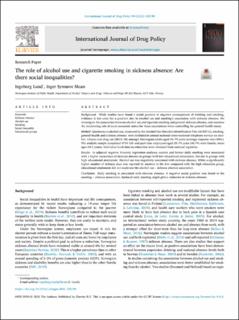The role of alcohol use and cigarette smoking in sickness absence: Are there social inequalities?
Peer reviewed, Journal article
Published version
Permanent lenke
https://hdl.handle.net/11250/2757600Utgivelsesdato
2021Metadata
Vis full innførselSamlinger
- Artikler [5061]
- Publikasjoner fra CRIStin FHI [7536]
Originalversjon
10.1016/j.drugpo.2021.103190Sammendrag
Background: While studies have found a social gradient in negative consequences of drinking and smoking, evidence is less clear for a gradient also in alcohol use and smoking’s association with sickness absence. We investigate the association between alcohol use and cigarette smoking and general sickness absence, and examine the moderating role of socio-economic status for these associations when controlling for general health status. Method: Questions on alcohol use, measured by the Alcohol Use Disorders Identification Test (AUDIT-C), smoking, general health and sickness absence were included in annual national cross-sectional telephone surveys on alco- hol, tobacco and drug use (2015–18) amongst Norwegian adults aged 16–79-years (average response rate = 59%). The analytic sample comprised 4719 full- and part-time employees aged 25–79 years (46.7% were female, mean age = 44.3 years). Individual-level data on education were obtained from national registries. Results: In adjusted negative binomial regression analyses, current and former daily smoking were associated with a higher occurrence of sickness absence in groups with low educational attainment, but not in groups with high educational attainment. Alcohol use was negatively associated with sickness absence. While a significantly higher number of sickness days was reported by smokers in the low compared with the high education group, educational attainment did not moderate the alcohol use –sickness absence association. Conclusion: Daily smoking is associated with sickness absence. A negative social gradient was found in the smoking –absence association. Reduced daily smoking might give a reduction in sickness absence.
